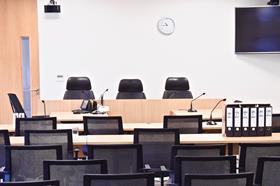The Solicitors Disciplinary Tribunal found an ‘experienced’ solicitor acted in a sexually motivated way toward a woman after commenting on her appearance and touching her waist, according to a judgment published today.

Daniel Paul Hutchings, admitted in 2010 and formerly with international firm Taylor Wessing LLP, was last month fined £30,000 and ordered to pay costs of £18,000.
The allegations against Hutchings were that while at a club he approached Person A, a solicitor previously unknown to him but who had also attended the earlier Society of Construction Lawyers lunch, and made comments about her appearance including ‘you’re really fit aren’t you’, ‘you’ve got a great bum’ and ‘look at your boobs’.
He also touched Person A by placing one or more of his hands on or around her waist area on one or more occasions and ignored Person A’s repeated attempts to make clear to him that his actions were unwanted.
The SDT found his actions were sexually motivated and amounted to a breach of principles 2, which Hutchings admitted, and 5 of the SRA Principles 2019.
The 19-page judgment said: ‘[Hutchings] had made those remarks [of Person A’s body] in an approving way, which indicated he found Person A attractive. Mr Hutchings had also asked Person A if she had a boyfriend. Person A and Witness B both recalled this.
‘Mr Hutchings’ answer did not directly address the issue of sexual motivation, though he accepted that his words were inappropriate.
‘The tribunal found this to be the clearest case of sexual harassment. ‘The tribunal, applying the test in Basson v GMC [2018], was satisfied on the balance of probabilities that Mr Hutchings made those remarks in pursuit of sexual gratification and in pursuit of a future sexual relationship.’
It added: ‘If [Hutchings] had been attempting to de-escalate the situation that he had created, there were several ways he could have done so that did not involve making any physical contact with Person A.’
The judgment found that the club event, held in Mahiki, in London’s Mayfair, was ‘part of a professional work event’ and ‘fell within matters related to Mr Hutchings’ professional practice’. Hutchings had been there as a solicitor and his behaviour had been a ‘significant departure from the ethical standards of the profession’ and ‘appalling in circumstances where the public would expect solicitors to behave professionally’.
It added that ‘The misconduct was mitigated by the fact that although there was more than one encounter, each was of very short duration in the context of a previously unblemished career.’






























